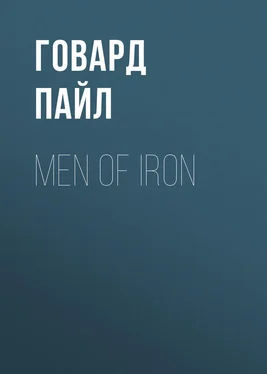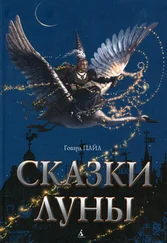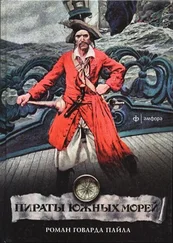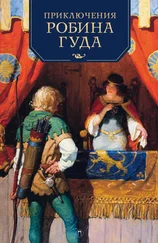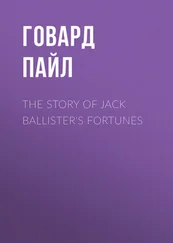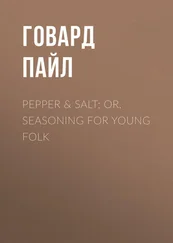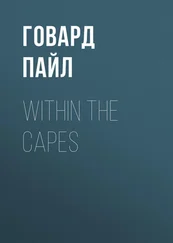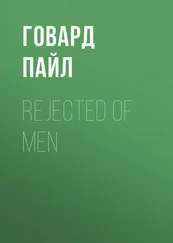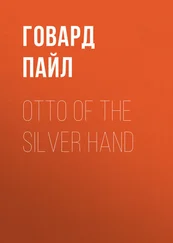Говард Пайл - Men of Iron
Здесь есть возможность читать онлайн «Говард Пайл - Men of Iron» — ознакомительный отрывок электронной книги совершенно бесплатно, а после прочтения отрывка купить полную версию. В некоторых случаях можно слушать аудио, скачать через торрент в формате fb2 и присутствует краткое содержание. Жанр: История, foreign_antique, foreign_prose, foreign_children, на английском языке. Описание произведения, (предисловие) а так же отзывы посетителей доступны на портале библиотеки ЛибКат.
- Название:Men of Iron
- Автор:
- Жанр:
- Год:неизвестен
- ISBN:нет данных
- Рейтинг книги:3 / 5. Голосов: 1
-
Избранное:Добавить в избранное
- Отзывы:
-
Ваша оценка:
- 60
- 1
- 2
- 3
- 4
- 5
Men of Iron: краткое содержание, описание и аннотация
Предлагаем к чтению аннотацию, описание, краткое содержание или предисловие (зависит от того, что написал сам автор книги «Men of Iron»). Если вы не нашли необходимую информацию о книге — напишите в комментариях, мы постараемся отыскать её.
Men of Iron — читать онлайн ознакомительный отрывок
Ниже представлен текст книги, разбитый по страницам. Система сохранения места последней прочитанной страницы, позволяет с удобством читать онлайн бесплатно книгу «Men of Iron», без необходимости каждый раз заново искать на чём Вы остановились. Поставьте закладку, и сможете в любой момент перейти на страницу, на которой закончили чтение.
Интервал:
Закладка:
He remembered being wrapped in the sheepskin that lay at the foot of his bed, and of being carried in Diccon Bowman’s arms down the silent darkness of the winding stair-way, with the great black giant shadows swaying and flickering upon the stone wall as the dull flame of the lamp swayed and flickered in the cold breathing of the night air.
Below were his father and mother and two or three others. A stranger stood warming his hands at a newly-made fire, and little Myles, as he peeped from out the warm sheepskin, saw that he was in riding-boots and was covered with mud. He did not know till long years afterwards that the stranger was a messenger sent by a friend at the King’s court, bidding his father fly for safety.
They who stood there by the red blaze of the fire were all very still, talking in whispers and walking on tiptoes, and Myles’s mother hugged him in her arms, sheepskin and all, kissing him, with the tears streaming down her cheeks, and whispering to him, as though he could understand their trouble, that they were about to leave their home forever.
Then Diccon Bowman carried him out into the strangeness of the winter midnight.
Outside, beyond the frozen moat, where the osiers, stood stark and stiff in their winter nakedness, was a group of dark figures waiting for them with horses. In the pallid moonlight Myles recognized the well-known face of Father Edward, the Prior of St. Mary’s.
After that came a long ride through that silent night upon the saddle-bow in front of Diccon Bowman; then a deep, heavy sleep, that fell upon him in spite of the galloping of the horses.
When next he woke the sun was shining, and his home and his whole life were changed.
CHAPTER 2
From the time the family escaped from Falworth Castle that midwinter night to the time Myles was sixteen years old he knew nothing of the great world beyond Crosbey-Dale. A fair was held twice in a twelvemonth at the market-town of Wisebey, and three times in the seven years old Diccon Bowman took the lad to see the sights at that place. Beyond these three glimpses of the outer world he lived almost as secluded a life as one of the neighboring monks of St. Mary’s Priory.
Crosbey-Holt, their new home, was different enough from Falworth or Easterbridge Castle, the former baronial seats of Lord Falworth. It was a long, low, straw-thatched farm-house, once, when the church lands were divided into two holdings, one of the bailiff’s houses. All around were the fruitful farms of the priory, tilled by well-to-do tenant holders, and rich with fields of waving grain, and meadow-lands where sheep and cattle grazed in flocks and herds; for in those days the church lands were under church rule, and were governed by church laws, and there, when war and famine and waste and sloth blighted the outside world, harvests flourished and were gathered, and sheep were sheared and cows were milked in peace and quietness.
The Prior of St. Mary’s owed much if not all of the church’s prosperity to the blind Lord Falworth, and now he was paying it back with a haven of refuge from the ruin that his former patron had brought upon himself by giving shelter to Sir John Dale.
I fancy that most boys do not love the grinding of school life – the lessons to be conned, the close application during study hours. It is not often pleasant to brisk, lively lads to be so cooped up. I wonder what the boys of to-day would have thought of Myles’s training. With him that training was not only of the mind, but of the body as well, and for seven years it was almost unremitting. “Thou hast thine own way to make in the world, sirrah,” his father said more than once when the boy complained of the grinding hardness of his life, and to make one’s way in those days meant a thousand times more than it does now; it meant not only a heart to feel and a brain to think, but a hand quick and strong to strike in battle, and a body tough to endure the wounds and blows in return. And so it was that Myles’s body as well as his mind had to be trained to meet the needs of the dark age in which he lived.
Every morning, winter or summer, rain or shine he tramped away six long miles to the priory school, and in the evenings his mother taught him French.
Myles, being prejudiced in the school of thought of his day, rebelled not a little at that last branch of his studies. “Why must I learn that vile tongue?” said he.
“Call it not vile,” said the blind old Lord, grimly; “belike, when thou art grown a man, thou’lt have to seek thy fortune in France land, for England is haply no place for such as be of Falworth blood.” And in after-years, true to his father’s prediction, the “vile tongue” served him well.
As for his physical training, that pretty well filled up the hours between his morning studies at the monastery and his evening studies at home. Then it was that old Diccon Bowman took him in hand, than whom none could be better fitted to shape his young body to strength and his hands to skill in arms. The old bowman had served with Lord Falworth’s father under the Black Prince both in France and Spain, and in long years of war had gained a practical knowledge of arms that few could surpass. Besides the use of the broadsword, the short sword, the quarter-staff, and the cudgel, he taught Myles to shoot so skilfully with the long-bow and the cross-bow that not a lad in the country-side was his match at the village butts. Attack and defence with the lance, and throwing the knife and dagger were also part of his training.
Then, in addition to this more regular part of his physical training, Myles was taught in another branch not so often included in the military education of the day – the art of wrestling. It happened that a fellow lived in Crosbey village, by name Ralph-the-Smith, who was the greatest wrestler in the country-side, and had worn the champion belt for three years. Every Sunday afternoon, in fair weather, he came to teach Myles the art, and being wonderfully adept in bodily feats, he soon grew so quick and active and firm-footed that he could cast any lad under twenty years of age living within a range of five miles.
“It is main ungentle armscraft that he learneth,” said Lord Falworth one day to Prior Edward. “Saving only the broadsword, the dagger, and the lance, there is but little that a gentleman of his strain may use. Neth’less, he gaineth quickness and suppleness, and if he hath true blood in his veins he will acquire knightly arts shrewdly quick when the time cometh to learn them.”
But hard and grinding as Myles’s life was, it was not entirely without pleasures. There were many boys living in Crosbey-Dale and the village; yeomen’s and farmers’ sons, to be sure, but, nevertheless, lads of his own age, and that, after all, is the main requirement for friendship in boyhood’s world. Then there was the river to bathe in; there were the hills and valleys to roam over, and the wold and woodland, with their wealth of nuts and birds’-nests and what not of boyhood’s treasures.
Once he gained a triumph that for many a day was very sweet under the tongue of his memory. As was said before, he had been three times to the market-town at fair-time, and upon the last of these occasions he had fought a bout of quarterstaff with a young fellow of twenty, and had been the conqueror. He was then only a little over fourteen years old.
Old Diccon, who had gone with him to the fair, had met some cronies of his own, with whom he had sat gossiping in the ale-booth, leaving Myles for the nonce to shift for himself. By-and-by the old man had noticed a crowd gathered at one part of the fair-ground, and, snuffing a fight, had gone running, ale-pot in hand. Then, peering over the shoulders of the crowd, he had seen his young master, stripped to the waist, fighting like a gladiator with a fellow a head taller than himself. Diccon was about to force his way through the crowd and drag them asunder, but a second look had showed his practised eye that Myles was not only holding his own, but was in the way of winning the victory. So he had stood with the others looking on, withholding himself from any interference and whatever upbraiding might be necessary until the fight had been brought to a triumphant close. Lord Falworth never heard directly of the redoubtable affair, but old Diccon was not so silent with the common folk of Crosbey-Dale, and so no doubt the father had some inkling of what had happened. It was shortly after this notable event that Myles was formally initiated into squirehood. His father and mother, as was the custom, stood sponsors for him. By them, each bearing a lighted taper, he was escorted to the altar. It was at St. Mary’s Priory, and Prior Edward blessed the sword and girded it to the lad’s side. No one was present but the four, and when the good Prior had given the benediction and had signed the cross upon his forehead, Myles’s mother stooped and kissed his brow just where the priest’s finger had drawn the holy sign. Her eyes brimmed bright with tears as she did so. Poor lady! perhaps she only then and for the first time realized how big her fledgling was growing for his nest. Henceforth Myles had the right to wear a sword.
Читать дальшеИнтервал:
Закладка:
Похожие книги на «Men of Iron»
Представляем Вашему вниманию похожие книги на «Men of Iron» списком для выбора. Мы отобрали схожую по названию и смыслу литературу в надежде предоставить читателям больше вариантов отыскать новые, интересные, ещё непрочитанные произведения.
Обсуждение, отзывы о книге «Men of Iron» и просто собственные мнения читателей. Оставьте ваши комментарии, напишите, что Вы думаете о произведении, его смысле или главных героях. Укажите что конкретно понравилось, а что нет, и почему Вы так считаете.
